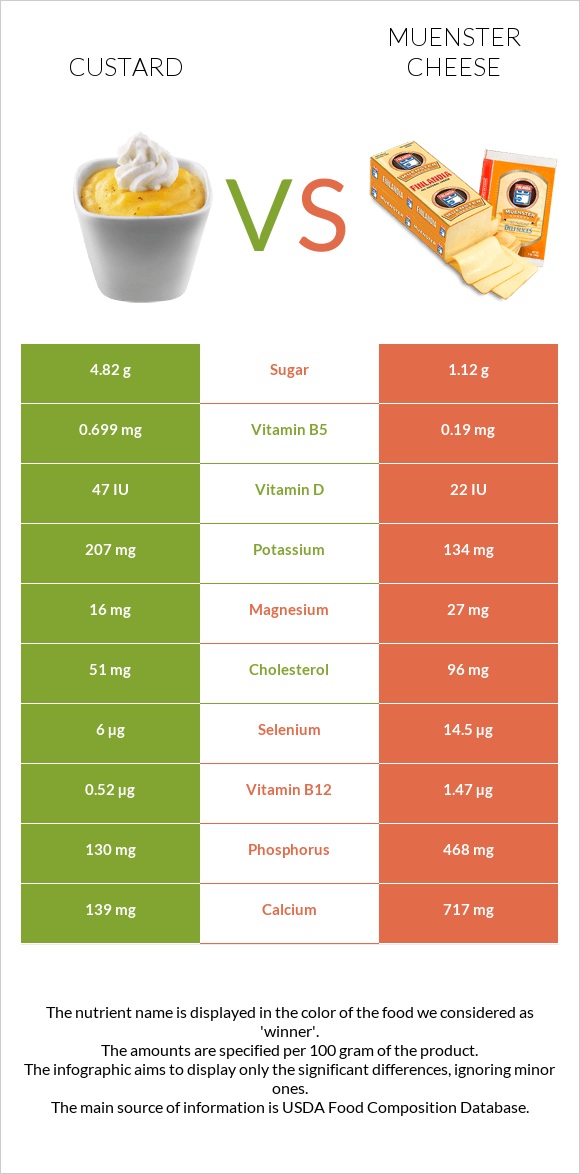Custard vs. Muenster cheese — In-Depth Nutrition Comparison
Compare
Significant differences between custard and muenster cheese
- Custard is richer in vitamin B5, while muenster cheese is higher in calcium, phosphorus, vitamin B12, zinc, vitamin A, and selenium.
- Muenster cheese covers your daily saturated fat needs 85% more than custard.
- Custard has 4 times more vitamin B5 than muenster cheese. Custard has 0.699mg of vitamin B5, while muenster cheese has 0.19mg.
- Custard is lower in cholesterol.
Specific food types used in this comparison are Egg custards, dry mix, prepared with whole milk and Cheese, muenster.
Infographic

Infographic link
Mineral Comparison
Mineral comparison score is based on the number of minerals by which one or the other food is richer. The "coverage" charts below show how much of the daily needs can be covered by 300 grams of the food.
| Contains more PotassiumPotassium | +54.5% |
| Contains less SodiumSodium | -86.6% |
| Contains more MagnesiumMagnesium | +68.8% |
| Contains more CalciumCalcium | +415.8% |
| Contains more IronIron | +20.6% |
| Contains more ZincZinc | +451% |
| Contains more PhosphorusPhosphorus | +260% |
| Contains more ManganeseManganese | +14.3% |
| Contains more SeleniumSelenium | +141.7% |
Vitamin Comparison
Vitamin comparison score is based on the number of vitamins by which one or the other food is richer. The "coverage" charts below show how much of the daily needs can be covered by 300 grams of the food.
| Contains more Vitamin CVitamin C | +∞% |
| Contains more Vitamin DVitamin D | +100% |
| Contains more Vitamin B1Vitamin B1 | +369.2% |
| Contains more Vitamin B3Vitamin B3 | +28.2% |
| Contains more Vitamin B5Vitamin B5 | +267.9% |
| Contains more Vitamin B6Vitamin B6 | +14.3% |
| Contains more Vitamin AVitamin A | +473.1% |
| Contains more Vitamin EVitamin E | +333.3% |
| Contains more Vitamin B2Vitamin B2 | +45.5% |
| Contains more Vitamin B12Vitamin B12 | +182.7% |
| Contains more Vitamin KVitamin K | +1150% |
| Contains more FolateFolate | +33.3% |
All nutrients comparison - raw data values
| Nutrient |  |
 |
DV% diff. |
| Saturated fat | 2.032g | 19.113g | 78% |
| Calcium | 139mg | 717mg | 58% |
| Phosphorus | 130mg | 468mg | 48% |
| Fats | 4g | 30.04g | 40% |
| Vitamin B12 | 0.52µg | 1.47µg | 40% |
| Protein | 3.99g | 23.41g | 39% |
| Vitamin A | 52µg | 298µg | 27% |
| Sodium | 84mg | 628mg | 24% |
| Zinc | 0.51mg | 2.81mg | 21% |
| Monounsaturated fat | 1.127g | 8.711g | 19% |
| Cholesterol | 51mg | 96mg | 15% |
| Selenium | 6µg | 14.5µg | 15% |
| Calories | 122kcal | 368kcal | 12% |
| Vitamin B5 | 0.699mg | 0.19mg | 10% |
| Vitamin B2 | 0.22mg | 0.32mg | 8% |
| Carbs | 17.6g | 1.12g | 5% |
| Vitamin B1 | 0.061mg | 0.013mg | 4% |
| Vitamin D | 47 IU | 22 IU | 3% |
| Magnesium | 16mg | 27mg | 3% |
| Vitamin D | 1.2µg | 0.6µg | 3% |
| Potassium | 207mg | 134mg | 2% |
| Vitamin K | 0.2µg | 2.5µg | 2% |
| Polyunsaturated fat | 0.312g | 0.661g | 2% |
| Iron | 0.34mg | 0.41mg | 1% |
| Vitamin E | 0.06mg | 0.26mg | 1% |
| Vitamin B6 | 0.064mg | 0.056mg | 1% |
| Folate | 9µg | 12µg | 1% |
| Choline | 11.8mg | 15.4mg | 1% |
| Vitamin C | 0.1mg | 0mg | 0% |
| Net carbs | 17.6g | 1.12g | N/A |
| Sugar | 4.82g | 1.12g | N/A |
| Copper | 0.03mg | 0.031mg | 0% |
| Manganese | 0.007mg | 0.008mg | 0% |
| Vitamin B3 | 0.132mg | 0.103mg | 0% |
| Tryptophan | 0.082mg | 0.327mg | 0% |
| Threonine | 0.192mg | 0.888mg | 0% |
| Isoleucine | 0.207mg | 1.145mg | 0% |
| Leucine | 0.337mg | 2.26mg | 0% |
| Lysine | 0.214mg | 2.139mg | 0% |
| Methionine | 0.091mg | 0.569mg | 0% |
| Phenylalanine | 0.173mg | 1.24mg | 0% |
| Valine | 0.233mg | 1.482mg | 0% |
| Histidine | 0.092mg | 0.829mg | 0% |
| Omega-3 - DHA | 0.003g | 0g | N/A |
Macronutrient Comparison
Macronutrient breakdown side-by-side comparison
Protein:
3.99 g
Fats:
4 g
Carbs:
17.6 g
Water:
73.45 g
Other:
0.96 g
Protein:
23.41 g
Fats:
30.04 g
Carbs:
1.12 g
Water:
41.77 g
Other:
3.66 g
| Contains more CarbsCarbs | +1471.4% |
| Contains more WaterWater | +75.8% |
| Contains more ProteinProtein | +486.7% |
| Contains more FatsFats | +651% |
| Contains more OtherOther | +281.3% |
Fat Type Comparison
Fat type breakdown side-by-side comparison
Saturated fat:
Sat. Fat
2.032 g
Monounsaturated fat:
Mono. Fat
1.127 g
Polyunsaturated fat:
Poly. Fat
0.312 g
Saturated fat:
Sat. Fat
19.113 g
Monounsaturated fat:
Mono. Fat
8.711 g
Polyunsaturated fat:
Poly. Fat
0.661 g
| Contains less Sat. FatSaturated fat | -89.4% |
| Contains more Mono. FatMonounsaturated fat | +672.9% |
| Contains more Poly. FatPolyunsaturated fat | +111.9% |





